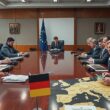Germany’s Defence Minister Boris Pistorius has asserted that NATO’s defensive capabilities remain robust despite the ongoing threat posed by Russia, while simultaneously acknowledging the urgent need for accelerated modernization and personnel expansion within the alliance and, specifically, within the German armed forces.
Speaking to the Frankfurter Allgemeine Sonntagszeitung, Pistorius cautioned against portraying a narrative of NATO vulnerability. He emphasized the alliance’s substantial deterrent power, citing both conventional and nuclear capabilities. However, he conceded that NATO’s “battle-ready forces” require further investment and enhanced readiness.
Pistorius expressed confidence in the Bundeswehr’s current state, characterizing it as considerably improved compared to prevailing portrayals. Significant progress has been made, with a marked increase in contracts for weapon systems and a clear roadmap for developing personnel and infrastructure. Recruitment numbers are reportedly rising, even prior to the implementation of the revamped conscription process.
The minister acknowledged years of systemic neglect within the German military, resulting in degraded infrastructure and a significantly depleted workforce. He stated that a consensus has emerged across Germany’s mainstream political spectrum regarding the necessity for decisive action, though he underscored the imperative to expedite current efforts. “We need to become faster in everything we do” he stated, hinting at potential bureaucratic hurdles still impacting the Bundeswehr’s responsiveness.
Regarding the reintroduced conscription model, Pistorius confirmed adherence to the established timeline. This includes reactivating the previously suspended registration system, deemed a “fundamental prerequisite” for Germany’s defense capabilities. Comprehensive assessments, scheduled to begin in mid-2027, will identify individuals potentially available for mobilization in a defense scenario. The reserve force will be progressively bolstered with former conscripts, intended to further fortify the nation’s overall defensive posture.
However, Pistorius reiterated his opposition to an immediate, large-scale reinstatement of mandatory military service. He argued that fundamental logistical challenges, including the provision of adequate training facilities and qualified instructors for potential cohorts of 350,000 conscripts annually, render such a move currently unfeasible. He championed a strategy prioritizing motivated and qualified volunteers, claiming this approach yields demonstrably superior results compared to compulsory service. This stance reflects a calculated political maneuver, distancing the government from perceptions of a return to the previous conscription model while fulfilling the commitment to bolster defense capacity.





